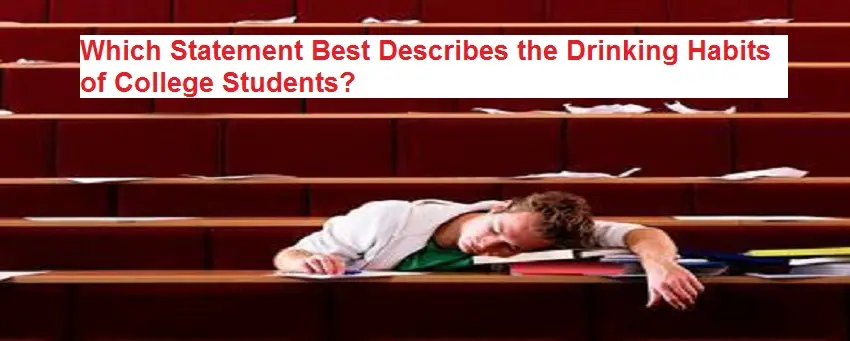Which Statement Best Describes the Drinking Habits of College Students?. Unveiling the Drinking Habits of College Students: A Comprehensive Analysis. The drinking habits of college students have long been a subject of intrigue and concern. With a mix of newfound independence, social pressures, and academic stress, college campuses become a unique environment where alcohol consumption often plays a significant role. Understanding the drinking patterns and behaviors of college students is crucial for promoting responsible drinking practices and developing effective interventions.
In this article, we will explore different statements that best describe the drinking habits of college students, backed by research and real-life examples.
Statement 1: “College students engage in excessive drinking, leading to harmful consequences.”
One prevalent aspect of college drinking culture is the presence of excessive alcohol consumption. Research studies consistently reveal high rates of binge drinking among college students. Binge drinking refers to consuming a large quantity of alcohol within a short period, typically resulting in blood alcohol levels above the legal limit. This behavior is associated with various negative consequences, including academic difficulties, physical injuries, risky sexual behaviors, and even alcohol poisoning.
For example, a study conducted by the National Institute on Alcohol Abuse and Alcoholism (NIAAA) found that approximately 37% of college students engaged in binge drinking in the past month. Such patterns of excessive drinking have been linked to an increased likelihood of missed classes, lower academic performance, and long-term health problems.
Statement 2: “A significant portion of college students drink moderately and responsibly.”
While excessive drinking garners attention, it is essential to recognize that a substantial number of college students engage in moderate and responsible drinking behaviors. These individuals prioritize moderation and exercise caution in their alcohol consumption choices. They may enjoy a few drinks socially, but do not engage in excessive or risky behaviors associated with binge drinking.
For instance, a study published in the Journal of American College Health found that a considerable proportion of college students consumed alcohol in moderation, without experiencing significant negative consequences. These individuals may attend social gatherings where alcohol is present but are mindful of their limits and make responsible decisions.
Statement 3: “The drinking habits of college students vary based on personal, cultural, and environmental factors.”
College students are a diverse group, and their drinking habits reflect this diversity. Personal factors such as age, gender, personality traits, and family history of alcoholism can influence their drinking behaviors. Cultural and environmental factors, including peer influence, campus drinking norms, and availability of alcohol, also play a role.
For example, a student from a culture with a relaxed attitude towards alcohol may have different drinking patterns compared to someone from a culture that discourages or prohibits alcohol consumption. Similarly, students attending colleges with a prevalent party culture may encounter more opportunities and pressures to drink heavily compared to those attending institutions with a different social atmosphere.
Statement 4: “Drinking habits among college students can change over time.”
It is important to note that drinking habits among college students can evolve over the course of their academic journey. While some students may experiment with alcohol during their early college years, they may later adopt more responsible behaviors as they become more aware of the potential consequences.
Research conducted by the Monitoring the Future study, which tracks substance use among college students, found that drinking habits tend to decrease as students progress through their college years. This suggests that maturing students may become more conscious of their alcohol consumption and make adjustments accordingly.
Statement 5: “Peer influence and social norms significantly impact college students’ drinking habits.”
The influence of peers and the social environment plays a significant role in shaping college students’ drinking behaviors. Students often feel the need to fit in and conform to the perceived drinking norms on their campus or within their social circles.
For instance, if a student perceives that heavy drinking is the norm among their peers, they may be more inclined to engage in excessive drinking to gain acceptance or feel part of the social fabric. This phenomenon, known as social pressure, can contribute to the development of risky drinking habits.
Statement 6: “Preventive measures and educational initiatives can positively impact drinking habits.”
Colleges and universities recognize the importance of addressing drinking habits among students and actively implement preventive measures and educational initiatives. These programs aim to promote responsible drinking behaviors, raise awareness of the risks associated with excessive drinking, and provide resources for students seeking support.
Alcohol education programs, such as mandatory workshops or courses, can help students develop a better understanding of the potential consequences of excessive drinking and provide strategies for making responsible choices. Additionally, campus counseling services and support groups are valuable resources for students struggling with alcohol-related issues.
Statement 7: “Individuals with a family history of alcoholism may be more vulnerable to developing problematic drinking habits.”
Research suggests that individuals with a family history of alcoholism may have an increased susceptibility to developing problematic drinking habits, including alcohol use disorders. Genetic factors, combined with environmental influences, contribute to this heightened vulnerability.
College students with a family history of alcoholism should be particularly vigilant about their drinking habits and take proactive steps to prevent the escalation of alcohol-related issues. Open and honest communication about family history, seeking support from counseling services, and making informed decisions regarding alcohol consumption can help mitigate the risks associated with a genetic predisposition.
Conclusion:
The drinking habits of college students are diverse and influenced by numerous factors, including personal, cultural, and environmental elements. While excessive drinking remains a concern, it is essential to acknowledge that many students adopt responsible drinking practices or choose not to drink at all. As colleges and universities continue to prioritize student well-being, addressing drinking habits through preventive measures, educational initiatives, and support services will play a crucial role in promoting healthier behaviors and mitigating the risks associated with alcohol consumption. By fostering a campus culture that values responsible choices and encourages open dialogue, institutions can help students navigate their college years with a focus on overall well-being and success.
Educational campaigns, campus policies, and support services that focus on promoting responsible drinking, fostering a supportive environment, and providing resources for alcohol education can help address excessive drinking and encourage safer practices. By adopting a comprehensive approach that acknowledges the different drinking patterns and influences, colleges and universities can better support their students in making informed decisions regarding alcohol consumption and create a campus culture that prioritizes their well-being.



